Reduced Electricity Use By 47.2% & Gas By 68.8% in Oct 2022
1st Nov bill 2021
Which is for whole of Oct to 1st Nov used
311.1kWh electric
913.9kWh gas
If I use the same this Oct 2022 at the new higher energy rates I expect to pay:
£0.75 per day standing daily charges
31 days x £0.75 = £23.25
311kWh E x £0.35056 = £109.02
913kWh G x £0.1033 = £94.31
Total £226.58
VAT 5%
= £237.91
However the Gov scheme will help with £66.
So if I use the same amount of energy I will pay approximately
£237.91 - £66 = £171.91
My actual 2022 Oct bill total cost me:
£107.19
Minus Gov Scheme £400 @£66 per month
£107.19 - £66 = £41.19
Compared to cost last year £117.49.
Now look at the comparison in energy use this Oct to Nov 2022 compared to Oct to Nov in 2021!
MY BILL COST WAS LESS IN 2022 THAN 2021 THEN TAKE OFF THE GOV SCHEME OF £66 AND LOOK!
2021 £117.49
2022 £41.19 (*with Gov scheme £66)
How?
I drastically cut my energy use in every way I could possibly think of!
2021 BILL Estimated annual usage
Gas 14,407kWh
Electric 3,734kWh
Monthly usage
Gas used 913.9kWh
Electric use 311.1kWh
Average daily use
Gas 29kWh
Electric 10kWh
Compared to daily use in 2020 my Electric reduced from 14kWh to 10kWh, my gas States the same at 29kWh per day.
2022 BILL Estimated annual usage
Gas 12,308kWh
Electric 3,229kWh
Monthly usage
Gas used 284.3kWh
Electric use 164kWh
Average daily use
Gas 9kWh
Electric 5kWh
Compared to average use last year per day, both have dropped gas from 29kWh to 9kWh, and electric from 10kWh to 5kWh. That is a reduction in energy consumption of about 50% electric and 60% gas.
Compare monthly use 2022 to 2021
2021 2022.
Gas 913.9kWh 284.3kWh (-629.6kWh)
Elec 311.1kWh 164kWh (-147.1kWh)
Gas down 68.8%
Electric down 47.2%
Some Of My Biggest Energy Saving Tips!
Look at the kWh of actual energy used from actual meter readings.
Take regular monthly actual meter readings and subunit them to your energy supplier.
Do not pay for more than use use.
Reduce heat loss by draft proofing and insulating.
Ensure light bulbs are low Watt LEDs.
Turn off lights not in use.
Do not leave things on standby.
Older models left on standby consume a considerable amount of energy.
Add thermal roller blinds and curtains.
Add draft excluder pillows at the bottom of drafty doors, especially external doors.
Is your letter box drafty?
Check seals on fridge freezers, ovens, Windows and doors.
Boiler settings optimal. I changed mine to E and switched off the pre-heat.
Have boiler regularly serviced.
Check radiators are heating through evenly, if not they may need bleeding to ensure they are working adequately.
Add reflective radiator foil behind radiators on external walls, to redirect heat back into the room.
Select the right thermostat temperature for your household, can you reduce it by 1°C? Ideal temperature. Lower thermostat temperature use less energy than higher temperatures.
Know about health and safety in relation to room temperatures.
Set the TRV (Thermostatic Radiator Valves) to the required temperature for each room, depending upon if the room is being used or not.
Methods of cooking some use far more energy than others. Can you adapt the ways you cook to be far more energy efficient? Like placing 4 items to cook inside a fan assisted oven, instead of 2 items inside then oven and 2 on the hobs?
Consider pressure cookers, Airfryers and slow cookers? When buying look at the Watts used per hour or kWh. The lower Watts the lower energy consumed per hour. Calculating the energy use of cooking appliances.
250W = 0.25kW per hour
500W = 0.5kW/h
1000W = 1kW/h
2000W = 2kW/h
When replacing old appliances select A+++, A++, A+ or A rated appiances, the energy efficiency chart says A uses least energy down to G uses most energy. However still look at the actual kWh use of each appliance.
Calculate your own usage
By looking at
Old reading - new reading = ?kWh used
Calculate costs by doing
Electric ?kWh used
x elec unit price per kWh
= £? Electric used
*Gas ?kWh used
x £? Gas unit price per kWh
= £? Gas used
Add £? Elec + £? Gas
= Subtotal of £
Then add 5% VAT
Subtotal of £ / 20 x 21
= £ total bill cost.
(*If you don't know how to convert your gas meter reading into kWh used then please see my other blog post.)
My blog has much information to help people save money on energy bills by reducing energy consumption.
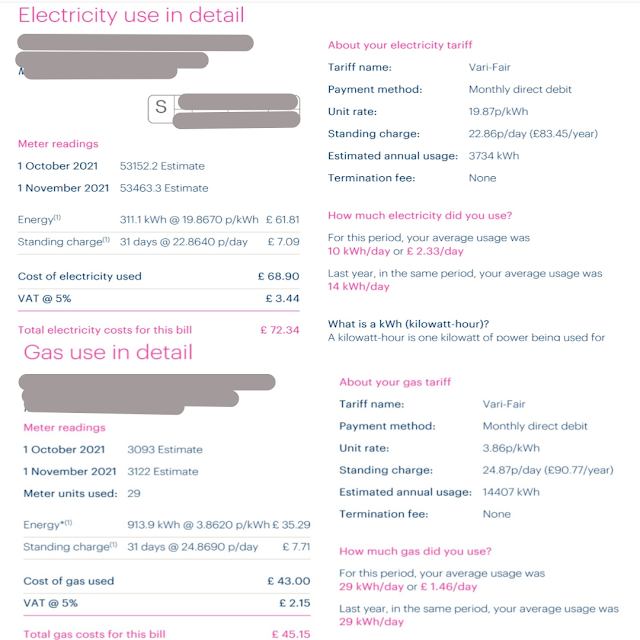

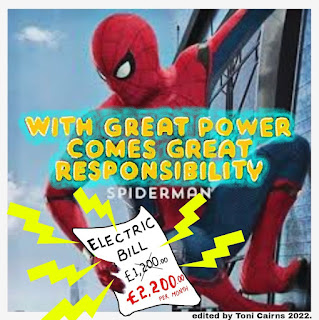
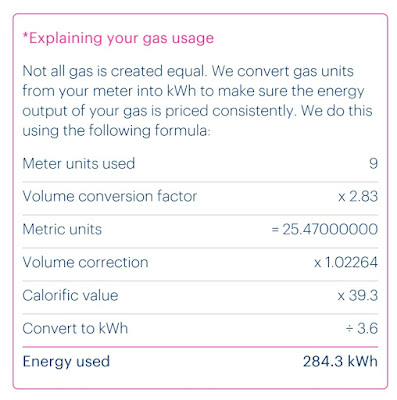
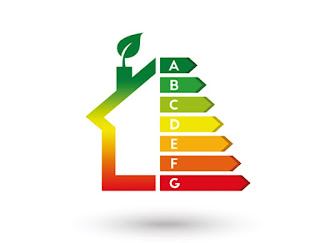
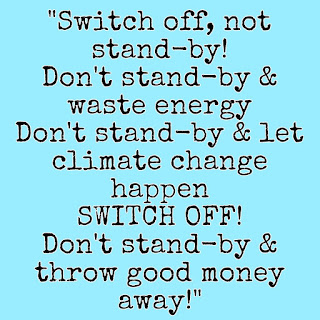
Comments
Post a Comment